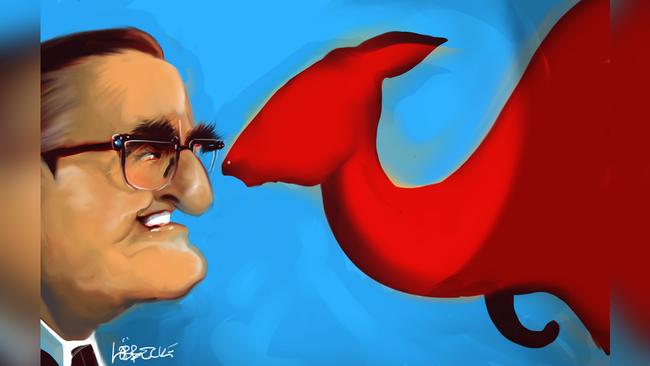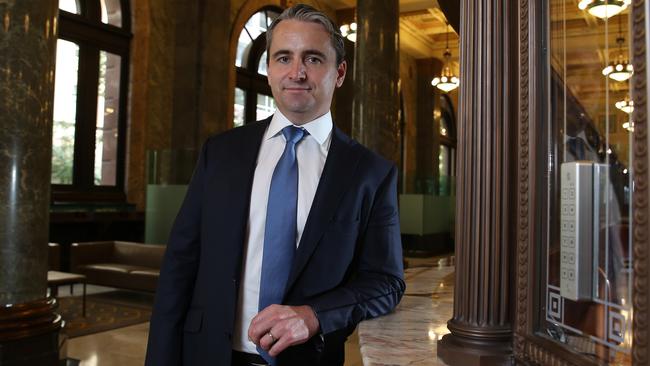CBA chief Matt Comyn positions himself as new face of change
CBA chief Matt Comyn has cleverly positioned himself as a new face open to change and ready to adopt the Hayne religion.

In the last half Commonwealth Bank boss Matt Comyn spent $432 million, or 64 per cent of total new investment, on regulation and compliance, which in an era of slow growth means earnings will be a cost-out affair.
The percentage spent on compliance is no surprise in the present climate, up from about 30 per cent three years ago, and Comyn noted he would like the percentage to fall to concentrate more on growth.
This is not a time when banks are talking much about growth and instead Comyn fielded many questions about the royal commission that he handled with typical skill and just the right level of contrition.
While an old timer at the bank (including running the retail division, which is where many of the snafus occurred), Comyn has cleverly managed to position himself as a new face open to change and ready to adopt the Hayne religion.

This process works as long as it is seen being done and he is obviously aware of the pitfalls.
The bank is doing OK on the costs score, with total expenses down 3.1 cent to $5.3 billion, but clearly this focus only gets bigger and, with costs to income at 39.7 per cent (just below target) and the revenue outlook weak, the game only gets tougher.
Revenue growth is slowing and, given RBA chief Philip Lowe’s comments on Wednesday putting the central bank back into neutral, that position is not about to change in a hurry.
CBA is also well placed in its capital position with an extra $6bn due in the next year from planned asset sales.
The sale of the wealth management assets will cut bank earnings by 5 per cent, so the aim is to spend the proceeds buying back shares to neutralise the impact.
The Hayne report has thrown some doubt around plans to sell off CBA’s mortgage broking businesses, including a 16 per cent stake in beleaguered Mortgage Choice and Aussie Home Loans.
Some 40 per cent of the bank’s mortgages are sold through the broker network, compared with the industry average of 59 per cent, but as noted on Wednesday the changes recommended by Kenneth Hayne, including the end of trailing commissions, were recommended by Comyn, so he can only be supportive.
Comyn said the bank was committed to adopting the Hayne recommendations but was not about to sign a new pledge as recommended by regulatory tsar Graeme Samuel.
The CBA boss also declined to comment on any criminal charges faced by the bank following Hayne’s report noting at least two criminal references sent to ASIC.
As Comyn said many times on Wednesday, “there is plenty of work left to do”, which does make you wonder how all his predecessors earned so much money.
Where’s he Gonski?
Amid all the commentary around the Hayne royal commission and absence of bank ethics and governance 101, one prominent name noticeably absent is ANZ chairman David Gonski.
Those at ANZ say his low profile certainly doesn’t mean lack of involvement in working through the issues internally, and the reality is chief executive Shayne Elliott has emerged as a star in presenting the bank’s case before the commission and in the media.
The decision that the bank is best presented through one voice of course also minimises the risk for others, but the reality in Gonski’s case is that his role as chair is well known, which means he can’t exactly hide when the mud is being thrown.
ANZ, for good reason given past misdemeanours, has played up the cultural change mindset away from doing what you can get away with to what is right and, in that process, changes in remuneration policy.
Separately, IAG did better than expected on Wednesday as it too unwinds the Hayne recommendations on unfair contract terms for general insurance, adding claims handling to the definition of financial services and, of course, following through on APRA’s notice that its executive pay will be subject to BEAR review.
IAG’s Peter Harmer is working through on the ethics of artificial intelligence, which he is using at the insurer to check on fraud with multiple car applications from different number plates with the same engine number and the like.
Virgin’s new chief
Virgin as expected finally named a successor to John Borghetti with DP World boss Paul Scurrah to take the job in an attempt to generate more operating earnings from the airline.
Borghetti has done an extraordinary job in creating a first-class new airline, but he has left a nightmare share register and the company financially challenged up against a behemoth in Qantas.
The Brisbane-based Scurrah is a veteran of complicated board rooms and difficult balance sheets from his past job running one of the two big port operators, DP World.
Virgin has four airline shareholders with about 20 per cent holdings and big egos and no one apparently willing to do what should happen, which is privatise the company.
Managing that mess is one key problem.
Scurrah has had a career in transport and logistics, including time at Flight Centre, Qantas, Ansett and Aurizon, so he knows a lot about moving people and containers, which is what Virgin does.
Safety and people are two of the skills he brings to the table, according to those who have worked with him.
The long-time client of Cosway public relations is being sold as a “can do” operating person to leverage off Borghetti’s strong base.
He will step down from the Australia Post board to take the job and, given the appointment starts from March, it seems Borghetti — who was good enough to give 18 months’ notice — can’t get out the door fast enough.
Running on empty
A new deal with Viva to give it total control over petrol prices was used by Coles for an effective profit downgrade, with its fuel business now only expected to earn $20m this year against market estimates of more than $100m and $133m last year. Earnings before interest and tax overall were expected to be more than $1.4bn, but petrol earnings will be down $100m, making it hard to meet that target.
The retailer was questioned on Wednesday on its figures and just why it used the new Viva deal as the vehicle for the downgrade.
Coles’s stock price was down 2.2 per cent at $12.44, while Viva was up 13 per cent at $2.18.
This was a reflection of the market reaction to the new deal, which will give Viva total control over petrol pricing.
At present, Coles sets the retail margin but Viva sets the wholesale margin and the net result has been that Shell is selling in the market at well above competitor prices. This has seen volumes plummet and explains the falling convenience store earnings in recent years.
Shell now only sells 62 million litres a week and Viva wants to lift that to 70 million in the short term and up to 75 million litres.
Under the new arrangement, Viva will set the retail margin which now stands around the 14c-a-litre mark, and pay a volume-based royalty to Coles of about 4c a litre.
It will also pay $137m as a one-off compensation payment, offset slightly by a commission on any above-market returns from the convenience-store profits.
The bulk of the division’s earnings come from petrol, but Coles won’t break out the figures.
Coles says there is upside from the deal because it will get access to new Viva sites and Viva will invest its new profit pool to cut retail prices.
This in turn will increase volumes and traffic into the convenience stores.
Coles chief Steven Cain said the changed arrangements would put the division on to a more sustainable basis and Viva’s Scott Wyatt agrees, because the two have extended the relationship for five years to 2029.
The market’s short-term concern is more about lower earnings amid a generally weak retail trading environment. Coles is still to release details of its Christmas trading.




To join the conversation, please log in. Don't have an account? Register
Join the conversation, you are commenting as Logout